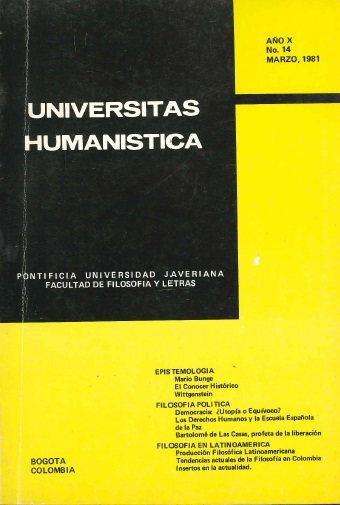Abstract
El presente artículo se propone mostrar que el conocimiento histórico es un caso de conocimiento. Al escribir la historia, se manejan implícitamente teorías cognoscitivas y problemas epistemológicos relevantes que pasan generalmente desapercibidos tanto por los historiadores como por los filósofos.
El conocimiento histórico se ocupa de objetivar lo que se va gestando en la experiencia histórica para la posteridad; para ello, el historiador se vale de procedimientos que aseguran en gran medida una comprehensión correcta. El proceso que aquí se señala es heurístico, selectivo, crítico, constructivo; proceso íntimamente ligado con el modo dé proceder auto-correctivo, práctico, concreto, particular, inmediato, propio del sentido común. Finalmente se abordan los problemas de la inteligibilidad de ios hechos históricos, el perspectivismo y la manera como éstos deben resolverse desde el interior de la comunidad de los historiadores profesionales.

This journal provides immediate open access to its content on the principle that making research freely available to the public, encourages greater global exchange of knowledge.
The journal Universitas Humanística is registered under a Creative Commons Attribution 4.0 International Public License. Thus, this work may be reproduced, distributed, and publicly shared in digital format, as long as the names of the authors and Pontificia Universidad Javeriana are acknowledged. Others are allowed to quote, adapt, transform, auto-archive, republish, and create based on this material, for any purpose (even commercial ones), provided the authorship is duly acknowledged, a link to the original work is provided, and it is specified if changes have been made. Pontificia Universidad Javeriana does not hold the rights of published works and the authors are solely responsible for the contents of their works; they keep the moral, intellectual, privacy, and publicity rights.
Approving the intervention of the work (review, copy-editing, translation, layout) and the following outreach, are granted through an use license and not through an assignment of rights. This means the journal and Pontificia Universidad Javeriana cannot be held responsible for any ethical malpractice by the authors. As a consequence of the protection granted by the use license, the journal is not required to publish recantations or modify information already published, unless the errata stems from the editorial management process. Publishing contents in this journal does not generate royalties for contributors.


